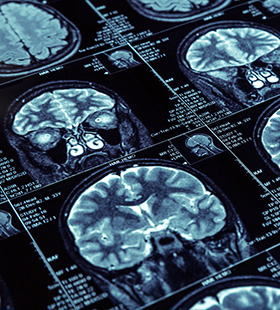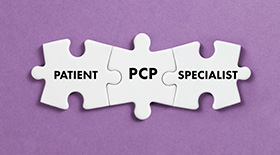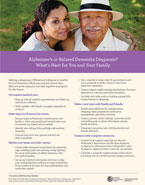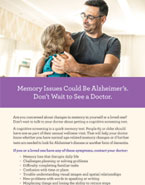Courses and Resources for Health Care Providers
CME and Quick Courses for Providers are Available Now!
The DSHS Alzheimer’s Disease Program has developed helpful courses and resources related to screening, diagnosis, care coordination and referrals for Alzheimer’s disease and other forms of dementia. These courses were developed for primary care providers (PCPs), who are often the first health professionals to address cognitive decline with patients and their families and caregivers and who play a critical role in management of the disease.
The free health care provider training courses are available on the HHS Learning Portal, a secure State of Texas platform. Visit the HHS Learning Portal, where you can create a free account and access the courses.
Free CME Courses
 Alzheimer’s Disease and Other Dementias: A Guide for Primary Care Providers
Alzheimer’s Disease and Other Dementias: A Guide for Primary Care Providers
This course is designed to help PCPs identify symptoms of Alzheimer’s disease and other forms of dementia, distinguish between various causes of dementia, recognize the importance of early diagnosis and treatment, and employ validated tools to facilitate diagnosis, care management or referral.
Credit hours: CME/CE - 0.75 Hours
 Alzheimer’s Disease and Other Dementias: Screening and Diagnosis in Primary Care
Alzheimer’s Disease and Other Dementias: Screening and Diagnosis in Primary Care
This course covers best practices and provides tools for conducting cognitive assessments and follow up testing, communicating with patients and family/caregivers, facilitating diagnosis, and determining next steps.
Credit hours: CME/CE - 1.00 Hour
 Alzheimer's Disease and Other Dementias: The Role of the Primary Care Team
Alzheimer's Disease and Other Dementias: The Role of the Primary Care Team
This course aims to equip primary care providers and affiliated healthcare professionals to play an appropriate role in ongoing care and management of Alzheimer’s disease and other forms of dementia and to connect patients and family/caregivers with support resources.
Credit hours: CME/CE - 1.00 Hour
Quick Courses: Dementia Disease Process
Primary care providers and specialists such as neurologists and neuropsychologists are the foundation of dementia healthcare in Texas. In addition to providing diagnosis, treatment, and care management, healthcare providers play a crucial role in connecting patients and their family/caregivers to essential support resources and services. These short courses provide an overview of the role PCPs play throughout the dementia disease process and how to connect patients and their family/caregiver with important resources.
 Connecting PCPs, Specialists and Family Caregivers
Connecting PCPs, Specialists and Family Caregivers
This interactive course provides an overview of the complementary roles PCPs and specialists play in supporting patients and family/caregivers through the dementia disease process.
 Resources for Patients and Family Caregivers
Resources for Patients and Family Caregivers
This interactive course presents resources, tips, and tools to help PCPs provide meaningful support and community referrals for patients and family/caregivers.
Provider Resources
The following resources are available for order at no cost for Texas providers. Visit the HHS Pinnacle ordering page for more information (registration is required).
 Patient Checklist and Resource Handout
Patient Checklist and Resource Handout
Providers are encouraged to download this resource as an easy handout to provide to patients and caregivers. The PDF covers the next steps in medical care, financial and legal arrangements, making a care plan, and connecting with resources. This also includes links to community resources for patients and their caregivers. En español.
 Cognitive Decline Handout for Patients and Caregivers
Cognitive Decline Handout for Patients and Caregivers
Providers may download this handout about warning signs of Alzheimer’s disease and related dementias for easy distribution in the healthcare provider’s office. This card will encourage patients and their caregivers to talk to their doctor about any suspected signs of cognitive decline. En español.
Videos
Hear from Texas dementia experts on the important role PCPs play in detecting, diagnosing and managing Alzheimer's disease and other dementias.